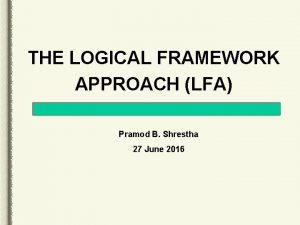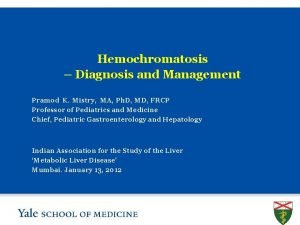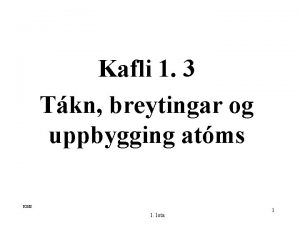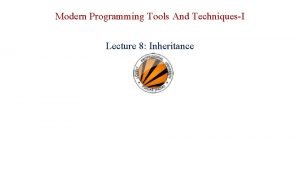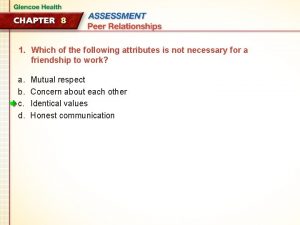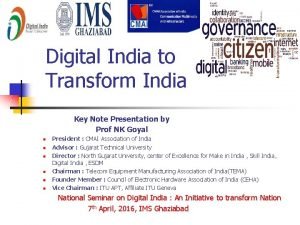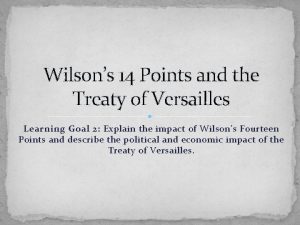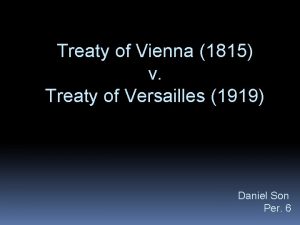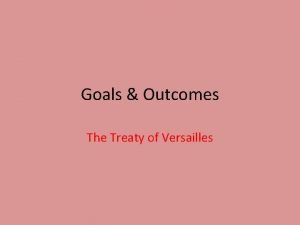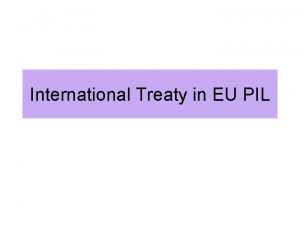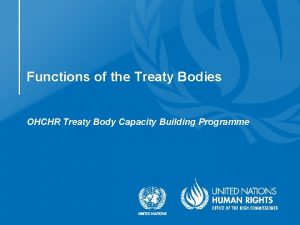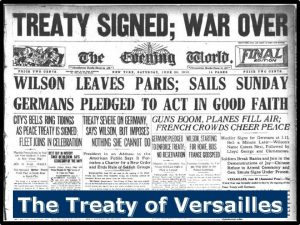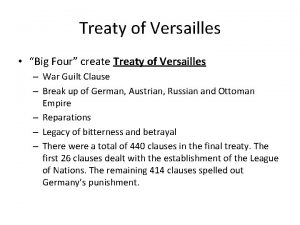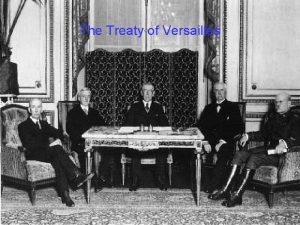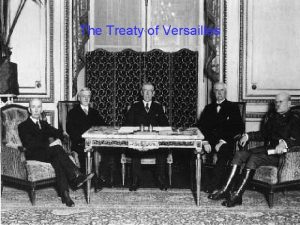A presentation on Treaty Override in India Pramod





















- Slides: 21

A presentation on Treaty Override in India Pramod Kumar IATJ Assembly, Amsterdam * 31 st August 2013

Disclaimer This presentation seeks to present the academic aspects relating to, and various points of view about, the concept of treaty override in India. This is not a statement of legal position, an expression of any legal opinion and it does not support any particular point of view. The views expressed herein do not reflect the views or the understanding of the author or author’s employer i. e. the Government of India, or the Income Tax Appellate Tribunal.

Treaty override – what is it ? �A situation where the domestic legislation of a State overrules the provisions of a single treaty or all treaties hitherto having had effect in that state. � In India, the expression ‘treaty override’ often refers to the situations where the provisions of tax treaty prevails over any inconsistent provisions of domestic law. This approach, however, seems to be at variance with the international practices. � Current Indian position summed up in ADIT Vs TII Team International Pvt Ltd (140 TTJ 649) http: //bit. ly/IATJ_7

Treaty override - backdrop � Treaty partners ought to observe their treaties, including their tax treaties. Pacta sunt servanda is not only good international law, it is good domestic policy. � Inter pretiveoverrides, nonmaterial overrides, and prospective overrides may not violate existing interna tional law. Substantive treaty overrides are, however, seen as breach of international law.

Interpretative override � � When an interpretation is legislated which is, or could possibly be, at variance with treaty interpretation by judicial forums, it can be termed as interpretative override. India – Explanation to Section 90 inserted to legislate that a higher tax rate foreign companies would not be in violation of the non discrimination clause in tax treaty US – Establishing CFC regime in 1962 to deal with tax heaven practices – a judicial view could be possible that such taxation of affiliates, which had no PE in US, was in violation of US tax treaties Are these cases of substituting judicial interpretations by legislative interpretations ?

Non material treaty override � No judicial precedents on what constitutes material breach of treaty, and, therefore, connotations of this expression remains undefined. �A material breach of treaty could be defined as taking away a significant bargained for treaty benefit which undermines the objectives of the tax treaty. � US example : separate basket limitation on foreign tax credits. While imposition of reasonable restrictions on foreign tax credits could be said to be reasonable, and thus consistent with the objects of the tax treaties, does it not dilute the mandate of treaty ?

Prospective treaty override � � Can prospective treaty override include the cases of announcing intentions to remove treaty limitations on taxability, but giving reasonable time to adjust to the same As part of the 1980 tax act (FIRPTA), the US announced its intention to override treaty limitations on its power to tax gain derived from the sale, directly or indirectly, of an interest in real property located within the United States. The override was delayed for five years, however, to allow the Treasury Department time to renegotiate U. S. tax treaties. The general acceptance of the FIRPTA override by U. S. treaty partners is consistent with the common treaty policy of reserving to the source country the right to tax real property gains.

Why treaty override ? � Primarily a legislative response to deny unintended treaty benefits to narrow the gap between professed and intended benefits visà-vis actual benefits � Resolution of tax treaty related issues outside the mechanism provided in tax treaties � Limitations of MAP and other remedial measures with regard to tax treaties

Why not treaty override ? � Breach of comity on which successful cooperation in international taxation is built � Impression that its going down the treaty obligations and deciding unilaterally which one it will chose to observe � Time for reducing the problems caused by uncontrolled treaty override by developing bilateral and multilateral mechanism that would legitimize interpretation of treaties and regulate non material breaches

Why not treaty override increase tax certainty which is sine qua non for business atmosphere conducive for enterprises and capital from treaty partners � To � As a confidence building measure, it may make sense to make it a specific policy not to dilute, curtail or otherwise tinker tax positions by resorting to direct or indirect treaty override. If so, judicial interpretations of treaty provisions may have to take that policy into account. � Heavy costs of tax uncertainty; one of the major reasons of the developing economic crises in many jurisdictions could be perception of tax uncertainties.

Permissible treaty override �A treaty override to check abuse of tax treaties is seen as permissible treaty override. Basket system of tax credits in US seen as an acceptable norm. �A treaty override to change the tax rates irrespective of tax treaty provisions would perhaps be impermissible treaty override. � Partial demise of non discrimination clause due to aggressive US position-a borderline area ?

Direct treaty overrides � Legislating the statutory provisions which restrict the application of tax treaties [ applicability of treaty provisions subject to GAAR, CFC, PE tax exclusion as in the proposed direct tax code in India] � Legislating the override by subsequent legislation theory [Section 258 (8) the new Direct Tax Code Bill in India] � Additional requirements introduced by legislation as anti abuse measures [Rule 21 AB]

Indirect treaty override � Legislating statutory provisions which exploit loopholes in the treaty provisions and thus defeat the object of tax treaties � Possible Indian Example ? Critics argue that incorporation of Mauritius Offshore Business Corporation Act 1992, after the India Mauritius DTAA was signed in 1983, is one such example of indirect treaty override. � Judicial response to this situation or hypothesis. Indian Supreme Court decision in Azadi Bachao Andolan’s case. No judicial interference.

Judicial approach in India � • • � Union of India Vs Azadi Bachao Andolan (263 ITR 706) – Government defending what could be termed as a very liberal use of treaties and taking a stand against treaty override by judicial or citizen activism “…. the court must deal with what is tangible in an objective manner and cannot afford to chase a will-o’-the-wisp”. Revenue precluded from questioning the commercial necessity or justification of a transaction provided that such transactions was not colorable or prohibited. An Act otherwise legal cannot be treated as non-est on the basis of some underlying substance Double non taxation permissible and acceptable

Judicial approach in India � On additional TRC requirement imposed by Rule 21 AB - no judicial decision as yet; the issue could be relevant in the coming years. � On treaty override resulting in double non taxation – No treaty override – if the other contracting state does not tax an income, that inaction does not give rise to the source state to tax that income [ ACIT Vs Green Emirates Shipping 100 ITD 203]. Subsequent treaty amendments uphold this stand.

Judicial approach in India � Reverse discrimination issues ( when non treaty override could result in discrimination to the resident enterprises vis-à-vis foreign enterprise) � Decision on both the sides. One school of thought is that when, in harmony with the overall objectives and scheme of the treaty, treaty provisions is required, it is required to be given effect. The other school of thought is that no matter what, the words of treaty must be honoured.

Mashreqbank � � 14 SOT 1 Assessee’s case was that since ‘subject to provisions of’ words missing in Article 7 (3) of India UAE tax treaty, the expenses must be allowed without recourse to artificial disallowances such as under section 37(2 A), 43 B etc. AO rejected the claim and disallowed the expenses under provisions of the IT Act. In appeal, CIT(A) confirmed the disallowance. ITAT confirmed the action of the AO and CIT(A) on the ground that it will amount to reverse discrimination. Treaty override upheld.

Mashreqbank � � Canadian Federal Court in Utah Mines vs The Queen 92 DTC 6194 : “The interpretation proposed by the appellant. . would have the effect of giving US taxpayer with a PE in Canada a more favourable treatment than its Canadian competitor. Such a result would not be in accordance with the policy expressed in the Preamble to the Convention and indeed would be contrary to it” UK Revenue’s International Tax Handbook “It would be inequitable to permit a non resident trading in a territory through a PE to deduct items which a resident would not be permitted to deduct. “

State Bank of Mauritius � � 2012 TII 150 ITAT MUM Disallowance under section 43 B does not come into play because there are no restrictions placed, in Article 7(3) which provides for computation of taxable profits of the PE, on deductions of expenses incurred for business if there is no restrictive clause in the treaty, then the expenditure incurred for the purposes of the business of permanent establishment has to be allowed in full. If a DTAA provides for a more liberal mode of computation of income, then it is this mode of computation, which needs to be followed notwithstanding any contrary provision contained in the Act. Treaty override rejected.

Rajeev Gajwani � � 129 ITD SB 145 Despite bar in s. 80 HHE, Non-Residents eligible for deduction in view of non-discrimination clause in DTAA The assessee, a US citizen and resident, exported software from his PE in India and claimed incentive deduction u/s 80 HHE Section 80 HHE provides that only resident taxpayers eligible for this incentive deduction. The assessee invoked Article 26(2), and claimed that he was treated less favourably than a taxpayer resident in India. The provisions of Section 80 HHE read down to include non residents as well and held to be discriminatory vis-à-vis non residents. Treaty override rejected.

Thank you !
 Toni and guy indirapuram
Toni and guy indirapuram Lunawat
Lunawat Effekr
Effekr Pramod mistry
Pramod mistry Pramod bhatotia
Pramod bhatotia Pramod ranjan
Pramod ranjan Pramod wangikar
Pramod wangikar Pramod adhikari
Pramod adhikari Toi
Toi Bgp loop prevention
Bgp loop prevention Dysrationalia override
Dysrationalia override Royalty override herbalife
Royalty override herbalife Static method can be override
Static method can be override Haas door override setting
Haas door override setting Ability to use responsibility to override emotions
Ability to use responsibility to override emotions Welcome to india presentation
Welcome to india presentation Welcome to india presentation
Welcome to india presentation Digital india presentation
Digital india presentation Mentovertical diameter
Mentovertical diameter Leopold maneuver
Leopold maneuver Treaty of versailles vs 14 points
Treaty of versailles vs 14 points The big three treaty of versailles
The big three treaty of versailles


